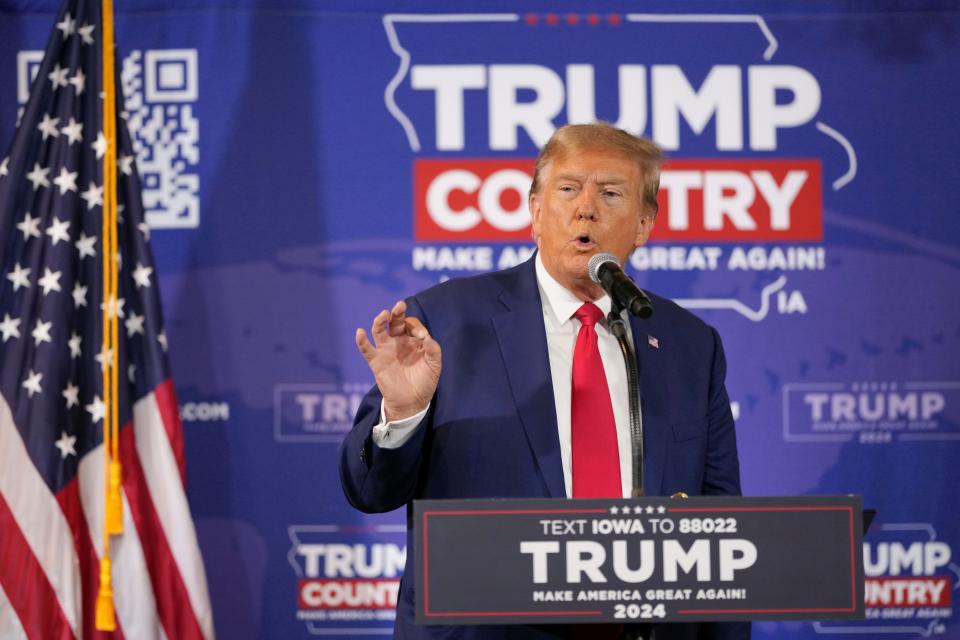In 'extraordinary' move, prosecutors ask Supreme Court to decide if Trump may claim immunity
WASHINGTON ? Special counsel Jack Smith on Monday took the "extraordinary" step of asking the Supreme Court to step into an ongoing legal battle about whether former President Donald Trump can claim immunity from criminal charges tied to his alleged interference in the 2020 election, attempting to leapfrog an appeals court that was expected to consider the question.
At the heart of Smith's request to the Supreme Court is a concern about timing: The special counsel wants to hold to the early March trial start that had been set in the high-profile case against Trump. If prosecutors have to wait for federal courts to resolve the immunity question through the normal process, it could take months.
"It's always a longshot bid for the Supreme Court to hear a case like this, without waiting for the process to play out in the lower courts," said Notre Dame Law School Professor Derek Muller. That said, Smith is rightly concerned about a slow appeals process that may interfere with a trial date and run even closer to Election Day. It seems unlikely it will persuade the Supreme Court to intervene, but it is worth asking given the risks of delay."
Going directly to the Supreme Court puts the justices on the hook to wade into the politically explosive Trump litigation sooner than had been expected. The court is almost certain to draw considerable criticism, no matter what it decides ? and sustained and widespread scorn from Trump if it rules in the government's favor.
The Supreme Court ordered Trump to respond to Smith's appeal by Dec. 20.
In a statement, the Trump campaign described the prosecution as "politically motivated" and said there was "no reason to rush this sham to trial except to injure President Trump and tens of millions of his supporters."
More Supreme Court action: Supreme Court lets stand Washington state 'conversion therapy' ban for LGBTQ+ minors
What's at stake: Immunity for Trump?
U.S. District Judge Tanya Chutkan earlier this month rejected a series of arguments from Trump to have the case against him dismissed, such as that he can't be prosecuted because his alleged actions were "at the heart of his official responsibilities as president." Trump appealed that decision on Dec. 7, a move he said would suspend action and potentially jeopardize the start of a trial in that case, which is currently scheduled to begin March 4.
By appealing to the Supreme Court, Smith argued that a delay is untenable, and that the nation's highest court should resolve the legal questions as quickly as possible.
"The United States recognizes that this is an extraordinary request. This is an extraordinary case," the government told the Supreme Court on Monday. The court should grant the case, Smith said, and "set a briefing schedule that would permit this case to be argued and resolved as promptly as possible."
Trump is fighting charges brought by Smith that could land him in prison for decades, including that he conspired to obstruct the process for certifying the election.

"Defendant’s four-year service as Commander in Chief did not bestow on him the divine right of kings to evade the criminal accountability that governs his fellow citizens," Chutkan said in her Dec. 1 ruling.
Trump argued that his alleged statements about the administration of a federal election "unquestionably" fell within the scope of his official duties because presidents are duty-bound to defend themselves publicly and promote policy initiatives.
How fast could the Supreme Court decide?
Typically, the nation's highest court takes its time: Months to weigh written briefs before deciding to grant a case. And then months more to schedule a case for arguments and months more for a decision. For instance, the court granted an appeal on Friday that had been initially filed in July. It is unlikely to hear arguments in that case until March.
But Smith noted that there is precedent for hurrying things along, including in cases dealing with presidential power. In 1974, the top court moved quickly to required President Richard Nixon to turn over audio recordings he had made in the Oval Office as part of the Watergate investigation. Smith cited the case in the brief, noting that the court granted the appeal a week after it was filed and decided the matter within 16 days.
This article originally appeared on USA TODAY: Supreme Court asked to wade into dispute over Trump immunity claims
